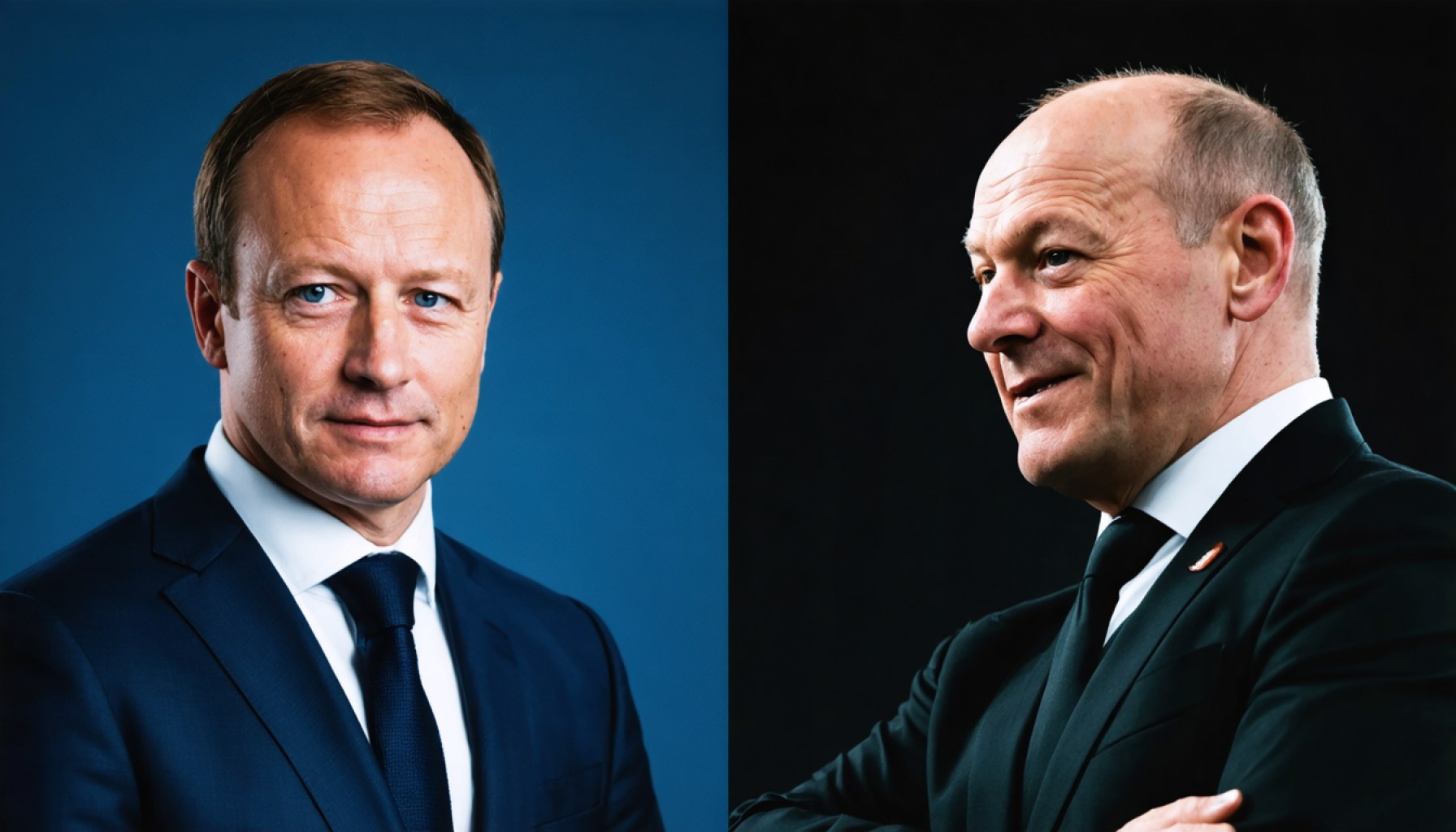- Germany’s political landscape is set for a major transformation with a pivotal election between Friedrich Merz and Olaf Scholz.
- Friedrich Merz, known for his traditional political approach, returns to politics with a more mature perspective, aiming to unite and strengthen the political union.
- Olaf Scholz steps into the spotlight with newfound assertiveness, leveraging his experience as Minister and Chancellor to challenge his reputation.
- The narrative is captured in a compelling film chronicling their campaigns and efforts to captivate the nation with promises of change and continuity.
- As the election approaches, Germany watches closely to see if Merz will maintain his lead or if Scholz’s vigor will change the course of the nation.
- The outcome holds significant implications for Germany’s future direction.
Under the stark lights of Germany’s political arena, two starkly contrasting figures prepare for an election battle that promises to redefine the nation’s path. There stands Friedrich Merz, a beacon of traditional political grit, known for his impulsive energy now cloaked in a practiced statesman-like calm. Across the ring, Olaf Scholz, often a silhouette among the political elite, emerges with unexpected bravado, ready to cast aside his reputation for quiet contemplation.
Their respective campaigns tell a tale of transformation. Merz, once unseated by Angela Merkel, reprises his role in politics with a ferocity tempered by patience. In stark contrast, Scholz, backed by an extensive resume as Minister under Merkel and his term as Germany’s first mixed-coalition Chancellor, brandishes his newfound assertiveness. Both men look to captivate a nation with promises of change and continuity.
This thrilling narrative is chronicled with cinematic clarity in a new film that shadows their every move. The camera captures Merz honing his message to protect the Union’s fragile unity, a lesson learned from the bitter ashes of 2017’s electoral collapse. Meanwhile, Scholz grapples in the shadows of personal unpopularity, mustering resilience and hoping his political gamble pays off.
As election day looms, the air buzzes with anticipation. The essential question remains: Can Merz hold onto his lead or will Scholz’s unexpected vigor tilt the scales? The future of Germany hangs delicately, swayed by their every word and maneuver—a political duel that promises to keep the country spellbound until the final vote is cast.
Inside Germany’s Political Showdown: Merz vs. Scholz
How-To Steps & Life Hacks: Navigating Political Campaigns
Understanding the intricacies of political campaigns can be crucial for students of political science and aspiring politicians. Here are steps and techniques used by seasoned campaigners like Merz and Scholz:
1. Craft a Clear Message: Like Merz, who adapted his message to maintain party unity, it’s important to have a clear, resonant message that connects with voters.
2. Utilize Media for Storytelling: As seen in the film chronicling the campaign, visual storytelling can humanize candidates and convey their narratives effectively.
3. Engage Grassroots Movements: Deploying volunteers for direct voter engagement helps to establish a personal connection with the electorate.
4. Monitor Polls & Adjust Accordingly: Keeping a close eye on poll numbers to adjust strategies as necessary is critical for staying competitive, much like the agile tactics of Scholz.
Real-World Use Cases: Political Communication Strategies
The duel between Merz and Scholz offers examples of effective political strategies which can be applied broadly:
– Crisis Messaging: Scholz had to address his personal unpopularity, an indication that managing crises with transparency can instill confidence.
– Transformational Leadership: Merz’s evolution from impulsive to composed suggests that adapting one’s leadership style is vital in politics.
Market Forecasts & Industry Trends: Media’s Role in Politics
The making of a film shadowing the campaigns indicates a growing trend where media and politics intertwine, influencing public perception. In the future, expect:
– Increased investment in political documentaries.
– A rise in multimedia storytelling for election coverage.
Controversies & Limitations: Political Dynamics in Germany
Frequently, political figures face controversies that can be pivotal in campaigns. Merz and Scholz navigate complex political landscapes where:
– Policy Legacy Issues: Being associated with past administrations can affect candidates’ appeal, seen with Scholz.
– Polarizing Leadership Styles: Diverse styles, from Merz’s conservatism to Scholz’s pragmatism, both attract and repel segments of society.
Security & Sustainability: Digital Campaigning
As digitalization grows in electioneering, ensuring the security of campaign data is crucial. Future campaigns must prioritize:
– Robust cybersecurity measures to protect voter data and campaign communications.
– Sustainable practices, such as minimizing carbon footprints of campaign events.
Insights & Predictions: Future of German Politics
Germany’s political landscape is dynamic. Considering the Merz vs. Scholz contest, anticipate:
– Shifts towards coalition governments reflecting diverse political preferences.
– Increased youth engagement in politics, driven by global issues like climate change and digital transformation.
Tutorials & Compatibility: Leveraging Technology in Campaigns
Candidates are increasingly leaning on technology for campaign management, involving:
– Using mobile apps for voter engagement and data collection.
– AI tools to analyze voter sentiment and optimize outreach efforts.
Pros & Cons Overview: Merz vs. Scholz
– Merz: Pro—Experience and strong party backing; Con—Past controversies and conservative stance may alienate modern voters.
– Scholz: Pro—Clear plan and coalition-building skills; Con—Struggles with personal popularity and political baggage.
Actionable Recommendations
– Stay Informed: Regularly update yourself on political developments via reliable channels.
– Engage with Local Politics: Understand the impact of national policies on local communities to make informed voting decisions.
– Leverage Technology: Use apps and platforms to keep track of candidates’ policies and positions.
For more information on German politics, visit the BBC or DW.
